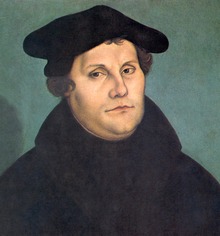Some major events that happened during this time were:
- The advent of music printing and publishing
- Breaking away from the Catholic church
- Shift from Latin to vernacular
- Shift from symbolism to early 'text painting'
Breaking away from the church and shifting to the vernacular were inevitable, I think. It would have happened no matter what point of the development of music composition was in. I would like to focus on the compositional style of this period instead. It is of most interest to me and seems like the most important outcome of this century when looking at the entire scope of the history of music. I also think the style was affected by the points listed above. It's all related.
It is exciting to finally see (and hear) the development of text painting as we know it today. Composers began to choose more emotional texts so that they could use striking melodies and harmonies. Gesualdo was especially known for this. Marenzio's use of chromaticism is especially striking. Acradelt's subtleties to represent certain words in the text are the beginnings of text painting.
Madrigals gained increasing popularity, as they gave composers to write music that was very secular and satirical. Because of the newness of printing music, these pieces could be spread to different parts of Europe and performed by anyone-no matter how professional or amateur.
Regarding the religion during this time, I see it as:
- The splitting from the Catholic Church
- The start of different denominations, which came with different liturgies and music to go along with them
- ie: Lutheranism and Calvinism
- This initiated the use of the vernacular so that all people could worship regardless of their knowledge of Latin. Many of these aspects still remain in different denominations of Christianity. (ie: the liturgy created by Luther and hymn settings from Calvinism are still used)
Random tidbit: my dad wrote a great arrangement years ago of "A Mighty Fortress" for our church. I will try and find a recording to post....definitely one of those tunes you should have burned in your brain as a musician...no matter if you do church music or not!

No comments:
Post a Comment